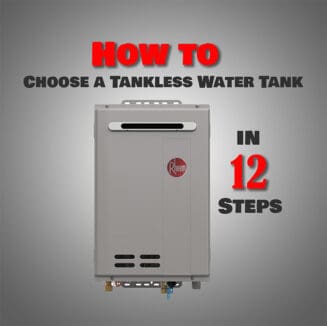
How to Choose a Tankless Water Heater for Your Home in 12 Steps
Choosing a tankless water heater is a crucial decision that can significantly impact your home’s energy efficiency and comfort. Here’s a detailed guide to help you make an informed choice!
1. Determine Your Hot Water Needs:
Calculating your household’s peak hot water demand is the first step in choosing the right tankless water heater. Consider the number of bathrooms, the size of your family, and the appliances that rely on hot water. By understanding your specific needs, you ensure that the chosen unit can efficiently meet the demands of your household, providing a continuous and reliable supply of hot water during peak usage times.
2. Fuel Type:
Tankless water heaters come in electric, gas (natural gas or propane), and hybrid models. The choice of fuel type is crucial and should align with factors such as the availability of the fuel source, the overall cost, and the existing infrastructure of your home. Assessing these elements will guide you in selecting a tankless water heater that not only suits your preferences but also integrates seamlessly with your home’s energy setup.
3. Flow Rate of the Tankless Water Heater:
The flow rate, measured in gallons per minute (GPM), is a critical specification that determines how much hot water the tankless heater can deliver. It’s imperative to match the flow rate with your household’s peak demand to ensure a consistent and sufficient supply of hot water. Understanding your specific flow rate requirements prevents any issues related to insufficient water delivery during the simultaneous usage of multiple fixtures or appliances.
4. Energy Efficiency:
When selecting a tankless water heater, prioritizing energy efficiency is essential for long-term cost savings and environmental considerations. Units with a high Energy Factor (EF) are more efficient, converting a larger portion of energy into hot water. Energy Star certification is a valuable indicator of a unit’s efficiency, providing assurance that the chosen model meets or exceeds industry standards for energy performance.
5. Size and Space:
Tankless water heaters are known for their space-saving design, but their sizes can vary. It’s crucial to choose a unit that not only fits the available space but also complies with installation requirements, including proper ventilation. Considering the physical dimensions ensures seamless integration into your home, avoiding potential challenges related to installation and spatial constraints.
6. Tankless Water Heater Installation Costs:
Before finalizing your choice, it’s essential to factor in installation costs, especially if transitioning from a traditional tank water heater. Gas units may require additional venting, and electric models might necessitate an upgraded electrical system. Understanding these installation requirements and associated costs helps you budget effectively and ensures a smooth transition to a tankless water heating system.
7. Maintenance Requirements:
Regular maintenance is key to a tankless water heater’s longevity and optimal performance. Checking the manufacturer’s recommendations for maintenance is crucial, as some units may require periodic flushing to prevent mineral buildup and maintain efficiency. Being aware of and adhering to the maintenance guidelines ensures that your tankless water heater continues to operate efficiently over its lifespan.
8. Temperature Control:
Opting for a tankless water heater with precise temperature control settings enhances your overall user experience. Some models offer advanced digital controls that allow easy and accurate adjustments to the desired hot water temperature. This feature ensures comfort and adds a layer of convenience, allowing you to customize the water temperature based on your preferences and specific needs.
9. Brand Reputation:
Researching and selecting a tankless water heater from a reputable brand is crucial for reliability and customer satisfaction. Examining online reviews, testimonials, and the brand’s history can provide valuable insights into the performance and durability of the chosen unit. Prioritizing a brand with a positive reputation enhances confidence in the reliability and effectiveness of the tankless water heater you select for your home.
10. Tankless Water Heater Warranty:
The warranty offered by the manufacturer is a significant consideration in choosing a tankless water heater. A longer warranty period reflects the manufacturer’s confidence in the durability and performance of the unit. Prioritizing a model with a comprehensive warranty provides an added layer of protection, ensuring that any potential issues or defects are addressed, giving you peace of mind regarding the longevity of your investment.
11. Water Hardness:
If you reside in an area with hard water, considering the impact on your tankless water heater is essential. Hard water can lead to mineral deposits, affecting the unit’s performance over time. Installing a water softener alongside your tankless water heater mitigates the risk of mineral buildup, preserving the system’s efficiency and extending its operational lifespan.
12. Professional Installation:
Hiring a qualified professional like Baker Roofing and Construction for the installation of your tankless water heater is a critical step to ensure proper setup and compliance with local building codes. Professionals possess the expertise to assess your home’s specific requirements, handle necessary adjustments, and guarantee a safe and efficient installation. Relying on professional installation enhances the overall performance and longevity of your tankless water heating system while minimizing the risk of potential issues during and after installation.
Back to Blog